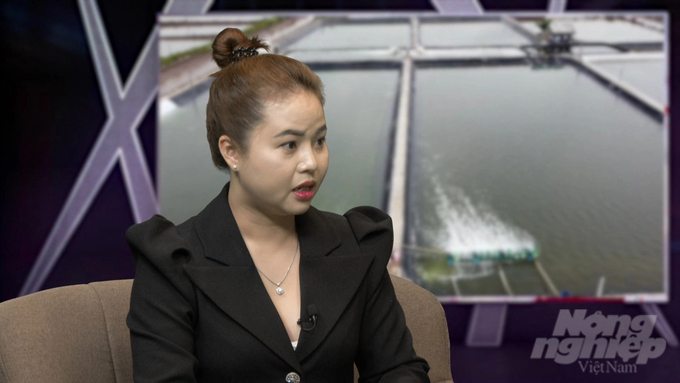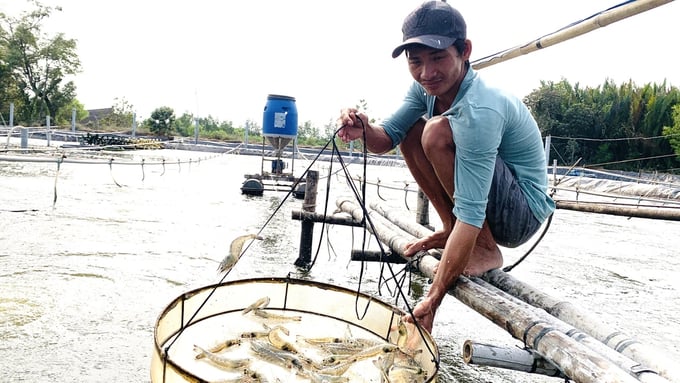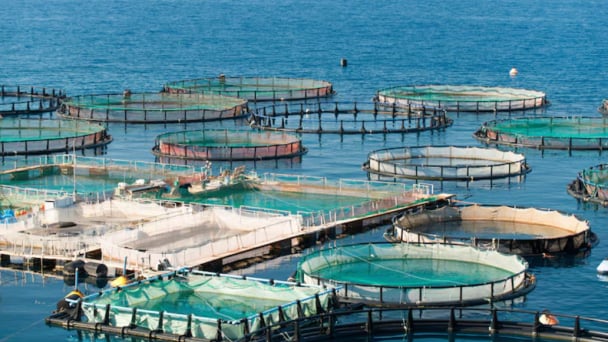June 3, 2025 | 19:20 GMT +7
June 3, 2025 | 19:20 GMT +7
Hotline: 0913.378.918
June 3, 2025 | 19:20 GMT +7
Hotline: 0913.378.918

Ms. Bui Thi Huynh Hoa, Director of Viet Duc Science Co., Ltd shared at the Seminar "Veterinary work determines success or failure in aquaculture”, organized by Vietnam Agriculture News. Photo: Ho Thao.
Ms. Bui Thi Huynh Hoa, Director of Viet Duc Science Co., Ltd shared at the Seminar "Veterinary work determines success or failure in aquaculture”, organized by Vietnam Agriculture News. Photo: Ho Thao.
According to statistics from the Department of Animal Health (MARD), in 2022, the total damaged shrimp farming area is over 23.4 thousand ha in 21 provinces and cities. This number is up 15.5% compared to 2021. In which, the area of intensive and semi-intensive shrimp farming suffered the most damage with over 8,500 ha.
Since the beginning of 2023, the whole country has had over 1.6 thousand ha of damaged shrimp farms. In which, the total area identified with the disease is about 688 ha. In particular, the disease situation of farmed shrimp occurs mainly in some localities in the Mekong Delta such as Ca Mau, Bac Lieu, Tra Vinh, and Soc Trang. To understand more about the above problem, Ms. Bui Thi Huynh Hoa, Director of Viet Duc Science Co., Ltd shared about the current problem of shrimp disease prevention and control.
According to Ms. Hoa, the current weather situation is unpredictable, leading to a very high risk of disease outbreaks on a large scale. People can lose everything if they lack the knowledge to proactively prevent diseases from the very beginning. To prevent diseases in shrimp, Ms. Hoa said that people should follow the direction of biosecurity. Farmers should prevent the disease from the very beginning.
"We support people with knowledge about prevention so that when they encounter a diseased shrimp situation, they remain calm and active in disease prevention. For example, when encountering a case of shrimp with liver disease, how to handle it? How should bowel disease be treated? We will instruct the people on the cause of the problem. First of all, people must know the cause in advance and then come up with a treatment method to reduce the damage," the Director of Viet Duc Science Co., Ltd said.
Talking about solutions to disease management on shrimp, Ms. Hoa acknowledges that her business is fortunate to inherit the scientific research of previous researchers. Therefore, Ms. Hoa advised farmers to choose biological and microbiological directions.
According to Ms. Hoa, it is more sustainable to be favorable to nature and in harmony with the environment. First, shrimp farming needs to be pre-emptive, such as using microorganisms to inhibit harmful bacteria in shrimp ponds.
Secondly, it is advisable to remove unnecessary organic nutrients in the ponds of farmers.
The third priority is to create a suitable environment buffer system for beneficial algae, and beneficial organisms to grow, and remove toxic gases in the pond to create a suitable environment for shrimp to grow.
Shrimp farming is associated with the water environment and farmers often call it water farming. Consequently, it will protect the aquatic environment and create suitable buffer systems for beneficial algae.
Beneficial microorganisms will immediately remove wastes in the pond when the shrimp sheds the shell. Shrimp manure and excess food are things that people should do immediately to protect shrimp ponds.

Shrimp farmers should use veterinary drugs, properly and responsibly to sustainably develop the aquaculture industry. Photo: Ho Thao.
According to the Director of Viet Duc Science Co., Ltd, aquatic veterinary drugs are classified into many types. Antibiotics are not necessarily bad, but people have to know how to use them in order to give the right and reasonable dose to the subjects they are raising.
"The amount of food that farmers feed each day must be suitable, not causing residues and avoiding drug resistance. Close monitoring in the shrimp farming process is very important," Ms. Hoa noted.
About the situation antibiotic trade banned for use in aquaculture, people still choose antibiotics of unknown origin to use. This issue affects key and honest businesses in the seafood sector.
Ms. Hoa cited the words of Minister of Agriculture and Rural Development Le Minh Hoan: "In order to develop a product line, we have to focus on the ecosystem of that industry to develop it sustainably."
Regarding livestock production, each person has to be responsible for the use of breeding stock, and waste discharge. Especially the responsibility lies with the manufacturers of aquatic veterinary drugs, the people, and the management agencies.
According to Ms. Hoa, the 2017 Fisheries Law specifically stipulates the responsibilities, rights, and obligations of aquaculture farmers. Therefore, each farmer needs to make efforts to do better to help the aquaculture industry develop safely and sustainably.
Translated by Hoang Duy

(VAN) Technology is redrawing the map of Vietnamese aquaculture: more modern, greener, and more sustainable.

(VAN) Novel process harnesses machine learning to reveal groups of genes that determine how efficiently plants use nitrogen.

(VAN) Several scientists and farmers are experimenting with soil treatment in some key durian-growing regions such as Cai Lay (Tien Giang), Dak Song, Gia Nghia, and Dak R’lap (Dak Nong).
/2025/05/25/4127-3-073637_820.jpg)
(VAN) Thanks to the promotion from an FAO-implemented project, vegetable production in greenhouses in Moc Chau has seen strong development, from 1.5 hectares in 2021 to nearly 50 hectares in 2024.

(VAN) FAO has recently supported USD 140,000 to implement the project 'Risk mitigation human-animal interface risks through disease control initiatives in pig farming.'

(VAN) The People's Committee of Tra Vinh province has approved an adjustment to the investment policy for the Green Hydrogen Plant project, increasing its area to approximately 52.76 hectares.
![Reducing emissions from rice fields: [2] Farmers’ commitment to the soil](https://t.ex-cdn.com/nongnghiepmoitruong.vn/608w/files/news/2025/05/05/dsc08881jpg-nongnghiep-140632.jpg)
(VAN) Clean rice cultivation model in Thuong Tan commune, Bac Tan Uyen district, is assisting local residents in achieving sustainable agriculture by substantially reducing costs, increasing productivity, and protecting the environment.